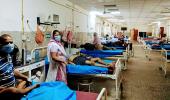The Delhi high court on Thursday said the existing medical infrastructure in the national capital was 'exposed' and in 'shambles' when put to the test during the pandemic and directed the Delhi government to provide facility for medical treatment as required by all residents of the national capital who are suffering from COVID-19.

A bench of Justices Vipin Sanghi and Rekha Palli further said the government was behaving like an ostrich with its head in the sand if it was disputing that the medical infrastructure was not in shambles.
"Now you are behaving like the ostrich with its head in the sand. When you defend this situation, then you are not rising above the politics. We always call a spade a spade," the bench said to senior advocate Rahul Mehra, appearing for the Delhi government, when he argued that the court may not say the medical infrastructure was in shambles.
The bench said, 'the existing medical infrastructure in the state is completely exposed... when it was put to the test and this court cannot turn away people like the petitioner by merely telling him that the state does not have the infrastructure to deal with his situation...'
To this Mehra said, "The existing infrastructure is struggling, but the court may not say it is in shambles as that has a different connotation to it. In the absence of oxygen what could the infrastructure do. Hospitals were reducing beds due to lack of oxygen."
He said the government has taken several initiatives, like augmenting beds by 15,000 and ICU beds by 1,200, which are in the pipeline and the oxygen is also coming in.
However, the bench said, "No that is not right. It is not just oxygen. Is oxygen enough? If you have oxygen, do you have everything? Pipeline is pipeline. They are not there now."
The observations and direction came while hearing a 53-year-old COVID patient's plea for an ICU bed with a ventilator as his SPO2 (oxygen saturation) levels had fallen to around 40 and he was unable to get ICU beds anywhere.
The court said that it was the obligation of the state to provide sufficient infrastructure to protect the lives of the people and the same cannot be understated.
"At the same time, we cannot lose sight of the fact that we are faced with a one in a century pandemic and even the most economically advanced countries found their infrastructure lacking to deal with the massive surge of COVID-19 patients requiring hospitalisation," the bench said.
Referring to the relief sought in the instant plea, the bench said it was sworn to protect the fundamental rights of the people and therefore, 'we are bound to issue a writ to the state to provide the infrastructure to enable the petitioner to undergo the treatment required to save his life...'
'At the same time we cannot lose sight of the fact that thousands of others are afflicted by the same disease in the city and whose condition may be as bad as that of the petitioner, if not worse,' it added.
The court said that just because the petitioner was able to approach the court cannot be a reason to pass an order in his favour so that he can steal a march over others who may not have had the same option.
"We, therefore, dispose of the petition with a direction to the respondent (Delhi govt) in rem that they shall provide facility for medical treatment as may be required by all the residents of Delhi who are suffering from COVID-19.
"In case they require hospitalisation, it shall be provided. If medicines, it shall be provided. If oxygen, it shall be provided. If ICU with or without a ventilator, the state would be obligated to provide that too," the bench said.
The court, however, made it clear that merely because it passed the order in the instant petition, it does not mean the petitioner can claim preferential treatment.
The bench said the order would also benefit all those similarly situated as the petitioner.










